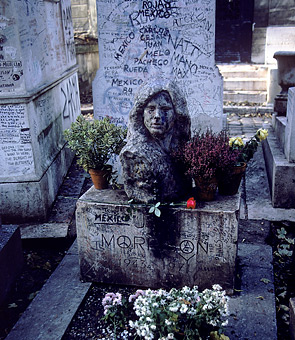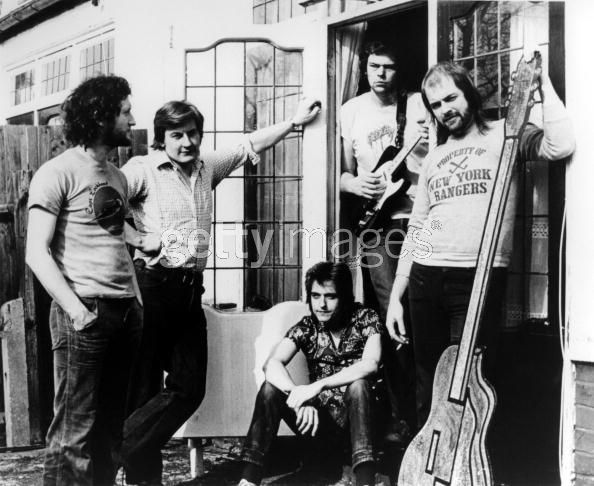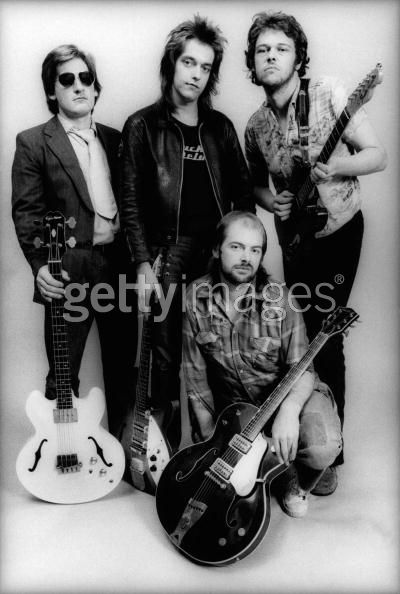You may have read this story about a guy who legally changed his name to Led Zeppelin II.


This would not be my choice for a new name, but I respect Led’s decision. Like the author of the article, I was wondering if his son will be named Led Zeppelin III? He says the change made him a better person and improved his quality of life, so more power to him.
We have aliases here at Rock Town Hall, but I can’t recall anyone whose alias is an album title. If you were going to change your real-life name to an album title, which one would you choose?
When Mr.Mod mentioned recently that he was making a trip to France, people wondered whether he would be taking the opportunity to visit Jim Morrison’s grave in Paris.


Jim Morrison's gravesite
I don’t believe he did, but I was wondering if any other Townsperson had ever made that pilgrimage. I can’t imagine doing that myself, not being a big Morrison fan, though I imagine it might be an interesting sociological experiment to see what kind of people would be there.
How about visits to other sacred rock sites? I wrote about by visit to the Experience Music Project and to Jimi Hendrix’s gravesite a few years ago.
Mention of Jim Ford and Joe South recently reminded me that I’ve been meaning to write something about Dallas Frazier, who is another one of those artists who was adept at blending country and soul. Frazier is the man who wrote “Mohair Sam,” which was a big hit for Charlie Rich.
This is the record that is part of Rock Lore, because the time the Beatles met Elvis, he was obsessed with it and supposedly played it constantly during their visit, even playing along on the bass. I’d never seen this clip before today, but here’s Rich singing it on Shindig in 1965:
He looks so uncomfortable there, but here is singing it again during his ’70s phase.
He was one of the biggest stars in Nashville at that time, and he’s gotten much less stage-shy. Nice shirt.
It turns out that in the mid-’80s a true stereo version of “Satisfaction” appeared on Japanese and German editions of Hot Rocks 1964-67, which are long out of print.
The acoustic guitar is even MORE prominent on this version than on the remastered mono version. And it turns out that there’s piano underneath the guitars too, played by Jack Nitzsche.
I know Mr. Mod is going to love this, but what about the rest of you?
Back in the day, when an artist had a hit record, conventional wisdom was that his or her label tried to follow it up with another record that was very similar in sound and concept.
So something like this…
ZCUcbRTB6Rs]
…was followed by something like this.
x9ZV65P_UC8]
Perhaps we can agree that, as delightful as “My Boy Lollipop” is, “Sugar Dandy” is a bit too close for comfort.
Can you think of a follow-up that was this close to its original? Can you think of a case where the follow-up was better than the original?
[Thanks to Simon Reynolds’ blissblog for pointing me to these video clips.]
In honor of the recent RTH interview with Martin Belmont I want to have a look at his first band, Ducks Deluxe, and the later careers of its members to see what it tells us about the evolution of British rock in the ’70s and afterwards.
As Martin says in the interview the Ducks specialized in rough and ready rock and worked best when focused on frontman Sean Tyla. Mr. Mod already posted the one good clip of the band playing one of its signature songs live, but here’s the studio version of “Coast to Coast.”
It was the opening track of their eponymously titled first album, and I love the way Tyla welcomes the audience with “All right, kids, are you readuh?” We’re going to talk more about him later, but Tyla was a real character, and he specialized in this kind of straight ahead, almost Springsteenian rock. Here’s “Fireball.”
Tyla also liked to write about imaginary Americana, so there are songs with titles like like “Rio Grande” and “West Texas Trucking Board.” The problem with Ducks Deluxe as a recording band is that you can’t really have a whole album of uptempo rockers like that, and they faltered a bit when it came to ballads. Also, there were two other songwriters in the band, our buddy Martin Belmont and Nick Garvey, and the vocals on those songs are much less distinctive than Tyla’s. Here’s Belmont’s “Something Goin’ On,” with later Ducks bassist Micky Groome on vocals:
The different styles of the songwriters just seem to make it a little hard to get a fix on the identity of the band. Live this probably would not have been so much of a problem, and the excellent covers on their albums (Eddie Cochran’s “Nervous Breakdown,” Bobby Fuller’s “I Fought the Law,” and Bobby Womack’s “It’s All Over Now”) give some other hints of why they were popular on the pub rock circuit. But as usual in this genre their records didn’t sell, and they disbanded in 1975.
They had a decently selected best-of LP named after another of their signature rockers, “Don’t Mind Rockin’ Tonight.”
It was issued in 1978, I assume because the members had achieved some fame in subsequent bands. I don’t think it ever made it out of the vinyl era, but you can probably find a copy. Despite their lack of sales at the time, they are now pretty well-represented on CD. Their two regular albums (the second one is called Taxi to the Terminal Zone) are available as a twofer. And there’s a second twofer with their third record, which was an EP, some stray tracks, and then the first album by the Tyla Gang, Sean’s next band, again about which more in a minute. The Ducks have actually reformed recently for some European dates, and they’ve issued a very nice, newly-recorded EP called Box of Shorts, which, except for being much better recorded, sounds pretty much like the original band. Here’s a clip of them performing a song from the EP, “Diesel Heart,” in Stockholm last year:



